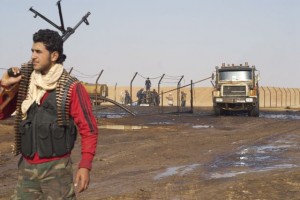
By David Enders, McClatchy Newspapers –
SHAHEL, Syria — Syrian rebels have captured two of the three major oilfields in the country’s southeastern Deir al-Zour province and are extracting oil that they say is helping to support their rebellion.
“We are at the beginning of winter, and people need oil to run the bakeries and to heat their homes. The weather is very cold here,” said a rebel leader here who, for security reasons, identifies himself by his nom de guerre, Abu Mohamed.
The capture of the fields is another blow to the Syrian government’s attempt to offset inflation and shortages of various goods in the areas it still controls. It also has set off a booming oil trade in this impoverished area. Dozens of trucks wait in line 24 hours a day to fill up at rebel-held wells, which produce a light crude that can be burned without refining, though the result is dense smoke. Some farmers insist the unrefined crude can be used to power farm equipment, though it seems primarily to be used for heat.
Some of those waiting in line at one well this week said they’d been waiting for days. Along roadsides and at intersections all over the area, men could be seen reselling the oil from improvised tanker trucks and barrels loaded into the backs of pickups.
Abu Mohammed said the price at which the rebels sell the oil is largely a symbolic one, and prices at the various wells in operation appeared to be about $5 a barrel, far below the world price that hovers above $80 a barrel.
But it does provide a profit to those who buy it and then resell it elsewhere in the country, where warfare and an international embargo have created a chronic shortage of fuel, made worse as winter sets in and temperatures drop. Last winter, Syrians desperate for heat even burned motor oil in the country’s west.
“I am a farmer, but this is better,” said Ali, a local man who declined to give his last name and said he resells the oil for about $14 a barrel in nearby provinces.
The endeavor is also a dangerous one. On Sunday, people were killed and injured when an explosion occurred at a well here, and that and another well in the area could be seen burning unabated days later, sending plumes of black smoke into the sky.
“We know this is not safe work, and it is bad for our health,” said Ali. “I have 22 children. What should we do?”
Few journalists have visited Zeir al-Dour since the rebellion against Syrian President Bashar Assad began 20 months ago, and reports that rebels control the oilfields have come second-hand through statements from rebel sympathizers. But a visit to the region shows that in fact the Syrian government has lost control of much of its crude production facilities.
Among the groups profiting from the wells are Jabhat al-Nusra, whose members have won admiration from some Syrians for their effectiveness as fighters against the government while inspiring fear and suspicion in others because of their calls for a Syrian state based on Islamic law and their alleged links to al-Qaida.
Rebels have also said they are planning a push into Hasaka province to the north, the country’s other major source of crude oil.
Abu Mohamed said that two of the three main fields around Deir al-Zour — the captured fields are known as al-Warde and Taim — are under rebel control, and that rebels would capture the third, Sheikh Omar, after they found engineers who could operate the wells.
Rebels said locating engineers had been a challenge because most of the people who were employed in the oil sector in Syria were Alawites, the religious minority to which Assad belongs and who make up about 10 percent of Syria’s population. Virtually all of the armed rebels in Syria are Sunni Muslims, who make up the majority of the country’s population. A main rebel grievance is that the country’s political, economic and military elites have been dominated by Alawites for decades.






